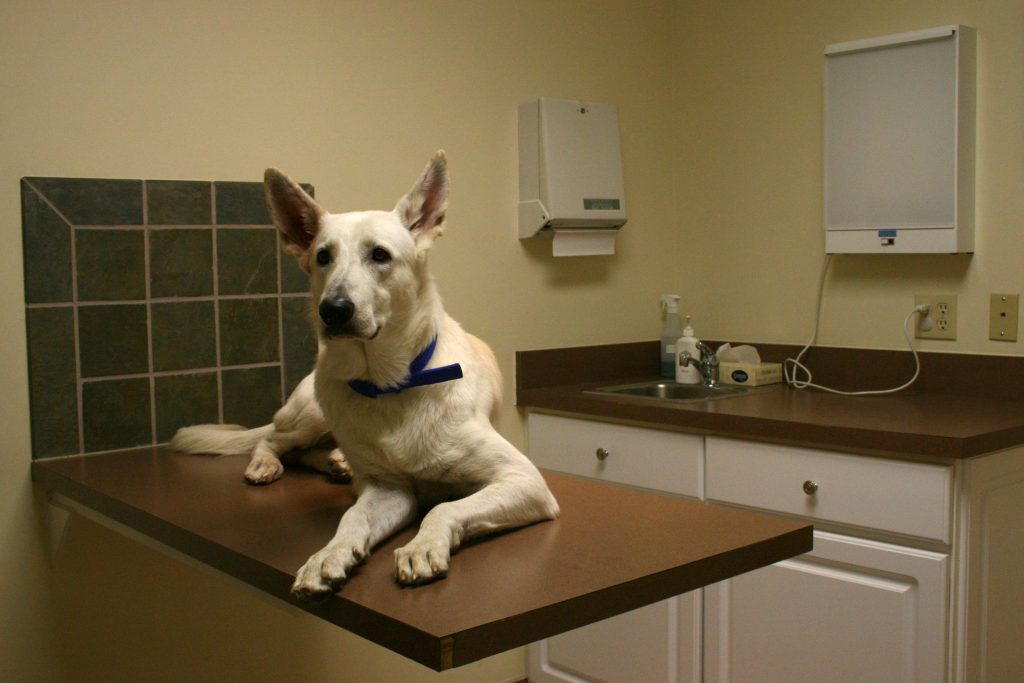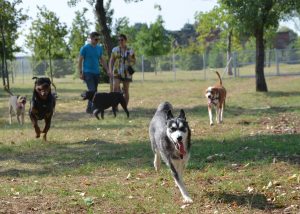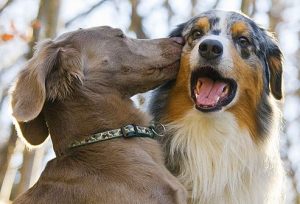Excellent Article on Canine Cough

By NANCY GALLIMORE WERHANE, CPDT-KA
I just survived my first, and hopefully only, major cold of this winter season. It was a beauty. Cough, congestion, stuffy nose, laryngitis-the works. I did receive a good deal of sympathy for it, but nobody panicked. Nobody rushed me to the hospital.
Now, give any one of those symptoms to a dog and stand back. Let a sweet-faced canine issue one wheeze and panic ensues. I am not making light of this phenomenon as I am as guilty as the rest of the dog moms and dads in this world.
 So what is it that makes it so much worse when a dog comes down with a bug? Well, I think the first issue is that our dogs have a really hard time describing their symptoms and telling us where it hurts. That makes us all feel just a bit helpless because, well, our dogs depend on us to make everything ok. Then there’s the fear that if you ignore something now, it may well later-say midnight on any major holiday-turn into something that inspires a costly-though-we-would never put-a-price-on-love trip to the emergency vet. And finally there are those darn puppy eyes. There is nothing more pitiful than seeing your normally bouncy, happy friend feeling anything less than bouncy and happy.
So what is it that makes it so much worse when a dog comes down with a bug? Well, I think the first issue is that our dogs have a really hard time describing their symptoms and telling us where it hurts. That makes us all feel just a bit helpless because, well, our dogs depend on us to make everything ok. Then there’s the fear that if you ignore something now, it may well later-say midnight on any major holiday-turn into something that inspires a costly-though-we-would never put-a-price-on-love trip to the emergency vet. And finally there are those darn puppy eyes. There is nothing more pitiful than seeing your normally bouncy, happy friend feeling anything less than bouncy and happy.
One of the most common ailments to strike our canine counterparts is often referred to as kennel cough. That name likely came about many years ago before our dogs had active social lives. Back when I was a kid, there were no dog parks or dog daycares (or cell phones or laptop computers, but that’s an entirely different story). If you did attend a group training class, it might be in the open air of the Fairgrounds parking lot and the dogs were not allowed to mingle.
Truth be told, the family dog rarely left home and if it did, it was probably for a trip to the vet, the groomer, or a stay at a boarding kennel. Since a boarding kennel was one of the few places where dogs came together, it was one of the primary places where dogs were exposed to germs. This is where most believe the name “kennel cough” was born.
Kennel cough, or today’s more “p.c.” term, canine cough, is most often characterized by a deep throated cough, which many dog owners describe as sounding as though the dog has something stuck in its throat. In print it looks something like this: Cough, cough, cough-hack. And the hack can include the expulsion of a foamy mucus. Words can paint such a pretty picture! The far harder to spell term your veterinarian will use is canine tracheitis or infectious tracheobronchitis. According to Dr. Lauren Johnson, of Southern Hills Veterinary Hospital in Tulsa, canine cough is a general term used to characterize a highly contagious cough that can be caused by one or several etiologic agents and can either be bacterial or viral.
Simply put, there isn’t just one cause for canine cough. Kennel cough, canine cough, infectious tracheobronchitis-whatever you decide to call it, the name is really an umbrella term used to cover a number of possible infectious agents.
 Because today’s active canine has quite the social life compared to their ancestors from decades past -yes, even those distant 90s-exposure to other dogs and therefore challenges to the immune system happen on a far more regular basis. Dogs have play dates. They go to training schools, they visit dog daycare for group play and they go to the dog park. They play, they romp and they swap spit. There’s no way around it.
Because today’s active canine has quite the social life compared to their ancestors from decades past -yes, even those distant 90s-exposure to other dogs and therefore challenges to the immune system happen on a far more regular basis. Dogs have play dates. They go to training schools, they visit dog daycare for group play and they go to the dog park. They play, they romp and they swap spit. There’s no way around it.
Just like kids going to school, germs go right along with them. Ask any teacher as a new semester of classes start up each fall and they’ll tell you they just brace for the new round of runny noses and sneezes to come. It’s basically inevitable. The price of socialization- which trainers and veterinarians will tell you is invaluable to the long term well-being of your dog-is possible exposure to disease. Of course this is why we vaccinate. We protect our dogs from contracting a lot of scary stuff. Parvovirus, distemper, rabies and other potentially devastating diseases are easily prevented with a proper series of vaccinations.
So for our social dogs there is the Bordetella vaccine, the one that stops canine cough. Problem solved, right? Well, yes and no. Go ahead, heave a collective sigh. The term Bordetella is derived from the name of a bacterium, Bordetella bronchiseptica, a chief causative agent in most cases of canine cough. “If you give your dog the Bordetella vaccine, either through nasal drops or injection, it will be protected from the particular strains in the vaccine itself, but not necessarily from all contagious coughs in general,” explains Dr. Johnson. “There are several things we don’t vaccinate for routinely that can cause the same contagious cough symptoms.”
“In addition, there are several variations of the Bordetella strains. Vaccines cannot include every strain. They can only contain the most common strains. Think about it like our flu vaccine. Some people receive this vaccine and still get sick.” So here’s how it goes, the infected dog sheds infectious bacteria and/or viruses in respiratory secretions. These secretions are then transmitted through the air via a cough or sneeze, or they are transmitted directly to another dog through nose-to-nose or mouth to mouth contact.
The tricky part for pet care professionals and owners alike is that a dog can have canine cough, but not yet be coughing or can even remain asymptomatic all together. That means a dog can come to the dog park, for example, play and act completely normal, but another dog may catch a bug from that dog and actually develop full symptoms.
So yes, your dog can be fully vaccinated and healthy as a horse, but still contract canine cough. Is this cause for panic? Should Fido live in a bubble? Well, of course not.
Take logical precautions. Do get the Bordetella vaccine. Even if it doesn’t totally protect your dog, it can help boost your dog’s immunity and hopefully lessen symptoms and duration of the infection if your dog does become ill.
If you plan to board your dog or take it to daycare, check the place out. You want to see plenty of space where there is good air circulation. You want to see that it is clean and you should feel free to ask about cleaning and disinfecting protocols.
Still, with all the precautions in the world, a dog can still catch canine cough at any facility where it comes in close proximity with other dogs. This includes a visit to your veterinarian, a walk through the animal supply store and a spa day at the groomer. It is not just limited to kennels.
So what do you do if your dog does give a little cough? According to Dr. Johnson, you should first isolate the affected dog from other dogs. That means no walks, no trips to the groomer, no training class, no daycare or dog park play. A mild case of canine cough will often go away on its own within seven to 10 days.
Does your dog need to see the veterinarian? It is never wrong to play it safe by seeking a professional opinion. You may first want to see if your dog is running a temperature. This can be easily accomplished through the use of a rectal thermometer and a little petroleum jelly. Yes, you really can do this. A normal temperature for a dog should range between 100.5 to 102.5 degrees.

If your pet’s coughing is excessive, accompanied by a fever, loss of appetite or any nasal discharge, you should call your veterinarian right away to have your dog assessed and to determine the proper course of treatment.
Antibiotics are not always necessary in the treatment of canine cough, just as they are not generally used in treating a mild cold in humans. “If the patient is a healthy dog with a mild cough, it is possible to forgo antibiotics and just treat with supportive care such as cough suppressants or possibly a steroid to reduce inflammation,” advises Dr. Johnson.
“However, if the patient is extremely young with a naive immune system, elderly, sickly or at risk of the infection progressing into pneumonia, then antibiotics may be necessary.”
“Mild cases of classic kennel cough are most often self-limiting. However, owners are often frustrated by the coughing, which can escalate at night and frequently disrupts everyone’s sleep, so at a very minimum we try to relieve symptoms.” Dr. Johnson further counsels that ideally, the affected dog should stay quarantined at home for up to 10 days beyond that last cough to prevent spreading the infection to other dogs. The good news is that in healthy dogs with uncompromised immune systems, it appears that regular socialization helps to build natural immunity to many of the common strains of canine cough. Yes, interaction with other dogs is still a good thing.
At the end of the day, if your dog develops a little cough, but is otherwise healthy and normal, it should come through the ordeal just fine. Perhaps we, the doting humans involved, should take two aspirin and then call the veterinarian in the morning.

